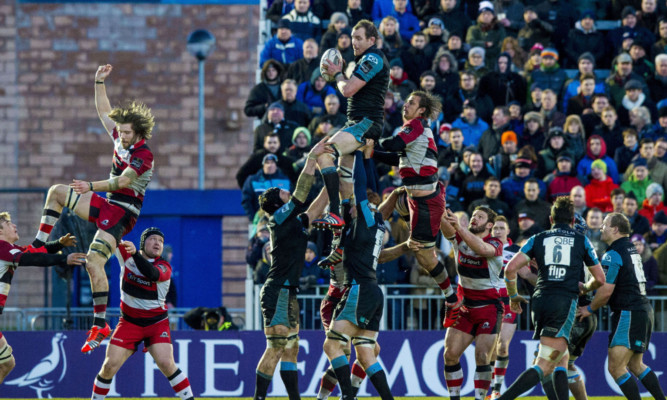It’s not just half-time in the 1872 Cup but also halfway through the Guinness PRO12 season, and Glasgow and Edinburgh’s situation is mirrored in both the local and broader scenarios.
Glasgow’s modest 16-6 victory at Scotstoun, their 11th win in a row on home ground against their great rivals, has the Warriors right where they want to be, pressing leaders Ospreys in second place in the table and ahead of all their Irish rivals.
While giving another performance that left more than a few boxes unticked, the Warriors are also handily placed in the two-legged parochial clash with a 10-point advantage to defend at BT Murrayfield on Friday night, where the wider expanses of ground should suit their style.
Edinburgh meanwhile are increasingly in need of a boost from somewhere if they are to meet their bottom-line target of a top six placing in the league, and it’ll have to come immediately if they are to breach that 10-point deficit on Friday.
The first leg of the 1872 Cup is always a cagey, niggly affair and this was no exception. In the end, much as last year’s first leg at Murrayfield, one defensive lapse capitalised on by the Warriors proved decisive.
Then it was Greig Tonks’ missed tackle on Alex Dunbar that opened up the defence for Stuart Hogg to score with ten minutes left. Here, it was Tom Brown being sat on his backside trying to tackle Sean Lamont, who combined with Peter Horne to give Josh Strauss the try just before half-time.
But the similarities between the games end there. Glasgow were, by everyone’s estimation, fairly lucky to win the first leg last year, but they rarely looked like losing this match.
Even without starting Sean Maitland, Tommy Seymour, Finn Russell, Mark Bennett and their two Fijian fireworks Niko Matawalu and Leone Nakarawa, the Warriors always carried far more threat than Edinburgh with ball in hand. Duncan Weir directly matters without fuss, Horne on his outside had a quietly influential game as a sort of second fly-half.
In addition, although wobbling a little in the scrummage, they had command of the lineout game with a masterly display from the old hand, club captain Al Kellock.
Kellock was quick afterwards to praise hooker Pat MacArthur for his throwing accuracy but there was one guy calling the shots and catching them. He also called the defensive move which suckered Edinburgh into a penalty obstruction when they had a chance for a lineout drive inside the Glasgow 22 the closest the visitors came to the try-line all afternoon.
That lack of cutting edge is what is holding back Edinburgh. Alan Solomons has talked about building the team from the ground up with conditioning, setpiece and defence in that order being right before he can turn his hand to fine-tuning the attacking game.
But even if you accept that the first three elements are now in order, leaving out Tim Visser hardly suggests there was any mood in the Edinburgh camp to chance their arm at Scotstoun. While no-one’s idea of a great defender, you’d have thought the physical strength of the Dutch-born Scotland wing would have stopped Lamont better than Brown did at the game’s key moment as well.
Edinburgh also weren’t helped by Matt Scott having possibly his poorest game in two years. Andries Strauss tackles and carries like a yeoman but is no kind of foil for attacking play and his presence, apparently essential, defeats the point of putting Greig Tonks at 10 for his running skills.
Tonks was moved to 15 early in the second half and Edinburgh started to at least look coherent in attack – there were 50 minutes played before Dougie Fife was asked to come off his wing and get involved. But by then Glasgow had command of the game.
Both coaches know that the second-leg is likely to be a more open and flowing game than Saturday not that difficult, to be honest and that will surely suit Glasgow more, as Edinburgh have just three bonus points for tries in two seasons under Solomons, and one of them was in losing the second leg of the 1872 last year.
They’ve scored 18 tries this season but take away the six they ran in against a pitiful Treviso last week and they’re one of the least prolific teams in the league.
The two downsides for Glasgow were the influential Rob Harley coming off with what looked like a nasty knee injury, and a perfectly good try by Matawalu being disallowed at the death.
Referee George Clancy and touchjudge David Changleng declined to consult the TV Match Official and stuck with their impression that DTH van der Merwe’s pass was forward despite both being five yards behind the play and the fact that it was replayed several times on the big screen just yards away from them.
Everyone in rugby is agreed that there is a gross overuse of the TMO by some referees, but Clancy’s one-man campaign to go the other way he didn’t check on a grounding on the final play of the France-Argentina test in November either is extreme.
As Gregor Townsend pointed out, the original concept of the TMO was to make sure marginal decisions involving tries were correct. It seems perverse not to use the technology in such situations.
